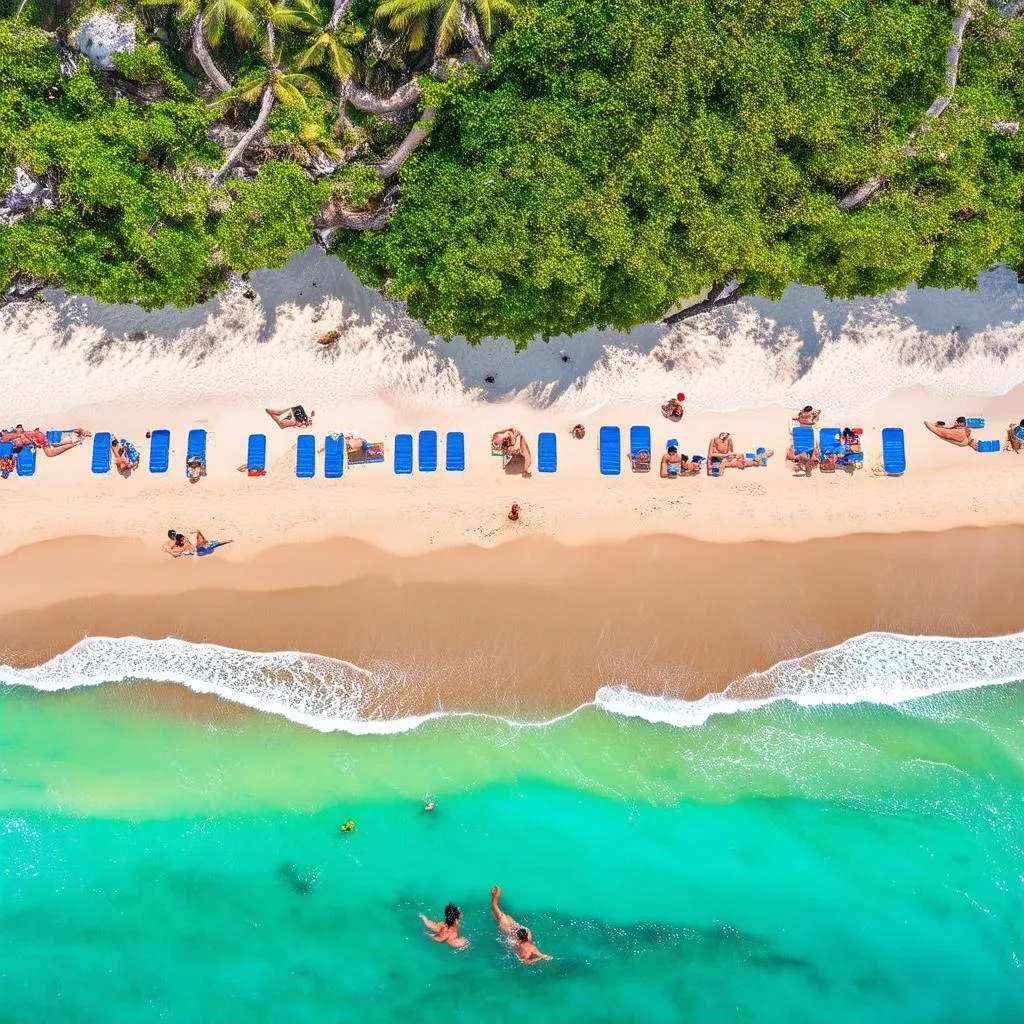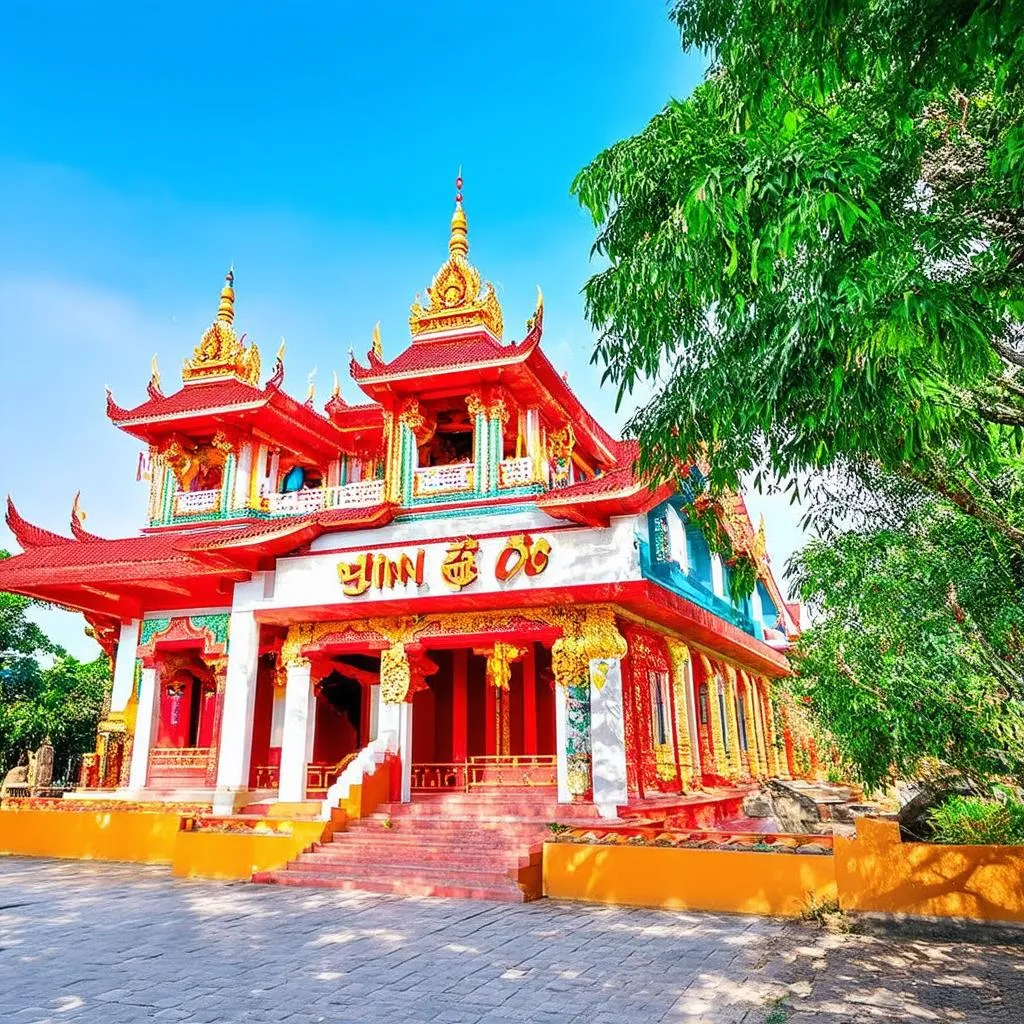Have you ever dreamed of escaping to pristine beaches, exploring historical temples, and indulging in delicious seafood? Well, Ba Ria – Vung Tau, a coastal province in Southern Vietnam, offers all that and more. This comprehensive guide will provide all the information you need to plan an unforgettable trip to this hidden gem.
Discovering the Charms of Ba Ria – Vung Tau
While often overlooked compared to its bustling neighbor Ho Chi Minh City, Ba Ria – Vung Tau boasts a unique blend of natural beauty, rich history, and vibrant culture.
“Ba Ria – Vung Tau surprised me,” says travel blogger John Miller, author of “Southeast Asia’s Hidden Gems”. “It has a laid-back charm that’s hard to find elsewhere in Vietnam. The beaches are stunning, the food is incredible, and the people are incredibly welcoming.”
Planning Your Ba Ria – Vung Tau Adventure
When to Visit
Ba Ria – Vung Tau enjoys tropical weather year-round, making it an ideal destination any time. However, the dry season from December to April offers the most pleasant weather for beach activities. If you don’t mind a little rain, the low season from May to November sees fewer crowds and offers great deals on accommodation.
Getting There
By Air: The nearest international airport is Tan Son Nhat International Airport (SGN) in Ho Chi Minh City, about a 2-hour drive from Vung Tau City.
By Road: Regular buses connect Ba Ria – Vung Tau with Ho Chi Minh City and other major cities in Southern Vietnam. Alternatively, rent a motorbike or car for a scenic road trip.
By Sea: Ferries operate between Vung Tau City and Ho Chi Minh City, offering stunning views of the Saigon River.
Where to Stay
From budget-friendly guesthouses to luxurious beachfront resorts, Ba Ria – Vung Tau offers a wide range of accommodation options to suit every taste and budget. For a truly immersive experience, consider staying in a homestay with a local family.
Getting Around
Motorbikes are the most popular mode of transport in Ba Ria – Vung Tau, offering flexibility and affordability. Taxis and ride-hailing services like Grab are also readily available. For a more leisurely pace, hop on a cyclo, a traditional Vietnamese rickshaw.
Unveiling the Must-See Attractions
Vung Tau City:
- Front Beach (Bai Truoc): A bustling beach with a lively atmosphere, perfect for swimming, sunbathing, and people-watching.
- Back Beach (Bai Sau): A quieter stretch of coastline known for its pristine beauty and crystal-clear waters, ideal for relaxing and enjoying water sports.
- Christ the King Statue: Ascend to the top of Nui Nho Mountain for panoramic views of the city and the ocean, and marvel at the iconic statue of Jesus Christ.
- White Palace (Bach Dinh): A former royal residence turned museum, showcasing artifacts and exhibits from the Nguyen Dynasty.
- Nghinh Phong Cape: Witness breathtaking sunrises and sunsets from this scenic viewpoint, renowned for its dramatic cliffs and crashing waves.
Beyond Vung Tau City:
- Long Hai Beach: Escape the crowds at this tranquil beach, known for its soft sand, clear waters, and laid-back ambiance.
- Binh Chau Hot Springs: Rejuvenate your body and mind at this natural hot spring resort, offering mud baths, herbal saunas, and therapeutic massages.
- Dinh Co Temple: Pay homage to the Goddess of the Sea at this sacred temple, perched atop a cliff overlooking the ocean.
- Ho Coc Beach: Explore the pristine beauty of Ho Coc Beach, renowned for its dramatic coastline, secluded coves, and sand dunes.
 Vung Tau Beach
Vung Tau Beach
Immerse Yourself in Local Experiences
- Indulge in Seafood Delights: No trip to Ba Ria – Vung Tau is complete without savoring the fresh seafood. Head to the bustling seafood markets or charming beachfront restaurants for a taste of the ocean’s bounty.
- Explore the Local Markets: Immerse yourself in the local culture at vibrant markets like Vung Tau Market and Long Dien Market, where you can find everything from fresh produce to handicrafts and souvenirs.
- Take a Cooking Class: Learn the art of Vietnamese cuisine with a hands-on cooking class, where you can master the flavors and techniques of this delicious cuisine.
- Visit a Traditional Fishing Village: Experience the authentic way of life in a traditional fishing village, where you can witness the daily routines of local fishermen and sample their fresh catches.
Travel Tips and Considerations
- Respect Local Customs: Vietnamese culture values modesty and respect. Dress appropriately when visiting temples and pagodas, and be mindful of your behavior in public.
- Bargaining is Common: Don’t be afraid to negotiate prices, especially at markets and souvenir shops. A little bargaining can go a long way.
- Stay Hydrated: The tropical climate can be hot and humid. Drink plenty of water and carry a reusable water bottle to stay hydrated.
- Learn Basic Vietnamese Phrases: While English is spoken in tourist areas, learning a few basic Vietnamese phrases will enhance your interactions with locals and enrich your travel experience.
 Dinh Co Temple
Dinh Co Temple
Feng Shui and Your Ba Ria – Vung Tau Journey
In Vietnamese culture, Feng Shui plays a significant role in everyday life, including travel. To enhance your journey, consider these Feng Shui tips:
- Choose Auspicious Travel Dates: Consult a Vietnamese calendar or Feng Shui expert to select travel dates that align with your personal element and bring good fortune.
- Pack Lucky Charms: Carry lucky charms associated with travel protection and good luck, such as a Pi Xiu figurine or a red envelope filled with lucky money.
- Stay in Rooms with Good Energy: When choosing your accommodation, opt for rooms with windows facing east or south for positive energy flow.
Frequently Asked Questions
Q: What is the currency in Ba Ria – Vung Tau?
A: The official currency is the Vietnamese Dong (VND).
Q: Is it safe to drink tap water in Ba Ria – Vung Tau?
A: It’s recommended to drink bottled water.
Q: Do I need a visa to visit Ba Ria – Vung Tau?
A: Visa requirements vary depending on your nationality. Check with your local Vietnamese embassy or consulate for the most up-to-date information.
Q: What language is spoken in Ba Ria – Vung Tau?
A: The official language is Vietnamese. English is widely spoken in tourist areas.
Q: What are some unique souvenirs to buy in Ba Ria – Vung Tau?
A: Consider purchasing locally made handicrafts, such as lacquerware, silk products, or hand-painted ceramics.
Conclusion
Ba Ria – Vung Tau beckons with its alluring blend of natural wonders, cultural treasures, and warm hospitality. From pristine beaches to historical landmarks and delectable cuisine, this hidden gem offers something for every traveler. So, pack your bags, embrace the spirit of adventure, and create unforgettable memories in the captivating province of Ba Ria – Vung Tau.
Start planning your trip today and discover the hidden treasures that await you. Don’t forget to check out more travel inspiration and tips on our website, travelcar.edu.vn, for an even more enriching journey.
We’d love to hear about your travel plans! Share your thoughts, questions, and experiences in the comments section below. Let’s inspire each other to explore the world, one destination at a time!